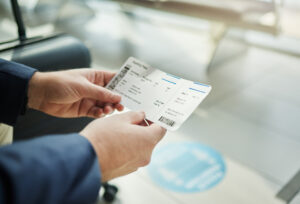Traveling for Work and the High Costs to Family
 With the advent of easy plane travel, many larger businesses have grown to include regional, national, and even international customers and work sites. People who work at the higher levels of industries often find their jobs are not done just at their desks, no matter how well connected they are electronically. Business relationships, decisions, and inspections can’t all be done without physically being on-site, and long-distance and extended travel are part of the job.
With the advent of easy plane travel, many larger businesses have grown to include regional, national, and even international customers and work sites. People who work at the higher levels of industries often find their jobs are not done just at their desks, no matter how well connected they are electronically. Business relationships, decisions, and inspections can’t all be done without physically being on-site, and long-distance and extended travel are part of the job.
You may look upon that lifestyle with envy. Well, don’t. Having worked with dozens of families and couples who have held jobs like this, I can tell you, from their experience, that these jobs can take a very heavy toll on satisfying family relationships. Before you make that big job your goal, I hope you’ll first consider what it can demand from your life.
- Physical toll: Traveling is exhausting no matter what class of seat you have on a plane. When you travel, your body is in a constant state of adjustment to different food, water, accommodations, climate, work expectations, and time zones. Any kind of steady, healthy patterns of sleep, exercise, nutrition, and relationships are interrupted, and it’s rough to try to keep up with good health habits somewhere else.
- Exit/reentry transitions: Life keeps moving on in your home, despite the traveler’s schedule. When you’re trying to pack, with your mind on the journey ahead, the family may feel your absence even while you are still home. Arriving home can be worse, as you’d love to be welcomed home with excitement, while the one who has been at home may want nothing more than to be relieved of the additional responsibilities he or she has been shouldering.
- Parenting patterns: When one parent in a family travels for work, the remaining parent has to temporarily become a single parent. Leadership around finances, yard work, car repairs, play dates, and school assignments have to shift to the parent who is home. Children can get accustomed to the traveling parent being the “fun” one who comes home with gifts and days off, leaving the at-home parent as the disciplinarian and enforcer, who becomes used to making parenting decisions solo.
- Emotional isolation: After spending enough days of the month away from home, it becomes very easy to live two lives: one on the road and the other at home. Even with regular phone, text, email, and Skype connections to those at home, the relationships that develop with those who share the travel with you can become more real to you than the ones you leave behind. Isolation, prestige, repetition, or intensity of the shared work adds to that other-worldliness. It’s at this level of isolation that I have seen long-term affairs, addictions, mood disorders, and health issues surface. These issues are not easily or often repaired.
Human relationships need physical proximity, regular conversation, shared patterns of caregiving, humor, health, and equality to thrive. Trying to have all these while traveling for a job is like trying to juggle three balls when all you’ve ever managed were two. If you are struggling with any or all of these issues as a family or couple, I encourage you to reach out to a family therapist in your area, who can help you manage the human challenges of traveling this much. While it’s not impossible to thrive, it is tough. Best buckle up. The captain has turned on the fasten seat belt sign.